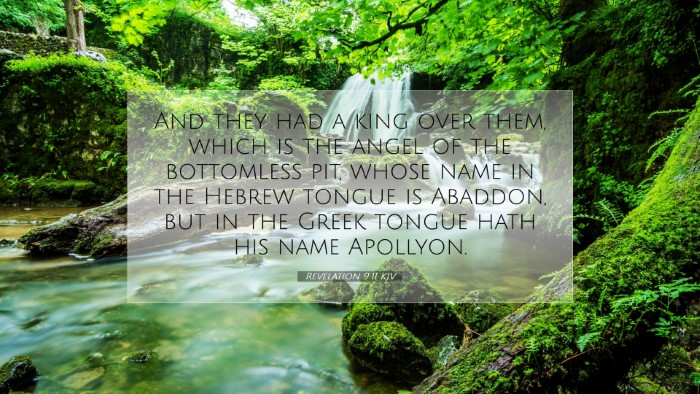Commentary on Revelation 9:11
Verse: “And they had a king over them, which is the angel of the bottomless pit, whose name in the Hebrew tongue is Abaddon, but in the Greek tongue hath his name Apollyon.”
Introduction
The apocalyptic imagery found in the Book of Revelation captures the conflict between good and evil through rich symbolism and prophetic utterance. Revelation 9:11 presents a significant element of this cosmic battle, where the figure of a king, often identified as a demonic entity, plays a pivotal role in the narrative of judgment and woe. This commentary combines insights from publicly available commentaries to provide a comprehensive understanding of this verse.
The Kingship of the Abyss
Albert Barnes emphasizes that the term "king" signifies authority and dominion. In this particular verse, the king is not a sovereign in the conventional sense but a representation of chaos and destruction emanating from the abyss (the bottomless pit). The existence of a king among the locusts suggests organized malevolence, making a distinction between mere creatures and those that are governed by a dark leader.
Identity of the King
-
Matthew Henry discusses the identification of the king with the “angel of the bottomless pit.” This angel is characterized not as a ministering spirit or a messenger of God but as a fallen figure leading the forces of darkness that are released as a judgment against unrepentant humanity. This portrayal illustrates the depth of evil manifested through demonic beings.
-
Adam Clarke expounds the names given to this king: “Abaddon” and “Apollyon.” The name “Abaddon” in Hebrew denotes "destruction," while “Apollyon” in Greek translates to “the destroyer.” This dual nomenclature effectively communicates the essence of the king's role: a harbinger of ruin and desolation.
The Location: The Bottomless Pit
The "bottomless pit" signifies a place of confinement for demonic forces. Barnes connects this imagery to the biblical concept of Sheol or the abyss, which is representative of captivity and torment. The angel alluded to, therefore, is not just a malevolent spirit but a leader empowered to unleash destruction on humanity during the eschatological unfolding.
Symbolism of the Locusts
Contextually, this verse is situated within the broader narrative of the fifth trumpet, where locusts symbolize tormenting entities unleashed upon those who have defied God. Henry notes that the tortures imposed by these creatures are spiritual in nature rather than physical, affecting the consciousness and morals of humankind.
Implications for Theological Reflection
This verse serves as a profound reminder of the sovereignty and judgment of God. The rise of the king from the abyss reflects divine allowance for evil to exist temporarily as a means of purification or judgment. As Clarke points out, this passage calls for serious introspection regarding the nature of man's rebellion against God. It illustrates the dire consequences that arise when one turns away from divine truth.
Application for Pastors and Theologians
For pastors and theologians, Revelation 9:11 offers an opportunity to engage with the complexities of spiritual warfare in contemporary ministry. The acknowledgment of evil forces must translate into a robust spiritual framework for worship, prayer, and pastoral care:
-
Spiritual Awareness: The reality of spiritual forces operating in the world should prompt congregations to remain vigilant and anchored in scriptural truth.
-
Deliverance Ministry: Understanding the demonic’s role as detailed in Revelation can inform practices of deliverance and healing within the Christian community.
-
Hope amid Judgment: Despite the dark imagery, there exists a promise of redemption and restoration through Christ, which can be emphasized in preaching.
Conclusion
In conclusion, Revelation 9:11 encapsulates a critical moment in the biblical narrative where the divine judgment confronts demonic forces under the rule of a destructive king. The insights drawn from public domain commentaries help illuminate the spiritual realities behind this verse, offering lessons on vigilance, accountability, and the ultimate hope in Christ. In understanding the power wielded by evil, believers are encouraged to ground themselves firmly in the Gospel and the victory of Jesus over sin and death.


